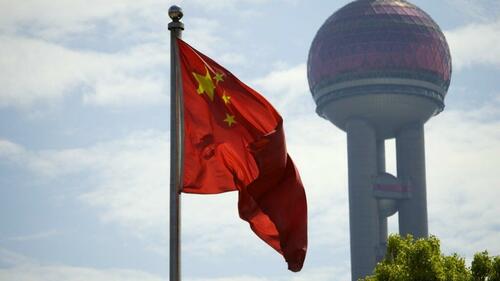
China imported 1,343 tons of gold in 2022, the highest import level since 2018. Total gold imports for the year were up 64% over 2021.
China ranks as the world’s biggest gold consumer.
Gold demand in China picked up during the last half of the year as the government relaxed some COVID restrictions. China imported 157 tons of gold in December to close out a strong H2.
The World Gold Council called it “a tale of two halves.”
On-and-off lockdowns in major cities during the first half suppressed local gold demand and imports. As COVID-controlling measures eased and the local gold price premium rose to a multi-year high, imports during the second half jumped. “
According to the WGC, strength in the Chinese gold market continued into January. The Shanghai-London gold price premium charted a mild rebound, putting a stop to the declining trend since last October. Stronger gold demand during January was key.
A recovery in the Chinese economy after it was strangled by government COVID restrictions helped drive the rebound in the gold market. China experienced a COVID peak in December. According to the World Gold Council, Chinese economic activities revived in January. That drove a boom in the gold market.
According to the China Gold Association, during the 15-day period from the Chinese New Year day to the Spring Lantern Festival, Chinese gold consumption was up by 18% year-on-year.
Gold withdrawals from the Shanghai Gold Exchange totaled 140 tons in January. That was a modest month-on-month decline of 2 tons and 25% lower than January 2022. But the lower number was primarily due to the 2023 Chinese New Year holiday that limited January to just 16 trading days. That was the fewest since 2012. When compared with previous Chinese New Year months, January’s withdrawal total was 12% higher than the 10-year average.
As we’ve reported, the People’s Bank of China resumed official gold purchases in November. That continued into January, with the Chinese central bank adding another 15 tons to its reserves. Gold now accounts for 3.7% of China’s total reserves.
The Chinese central bank accumulated 1,448 tons of gold between 2002 and 2019, and then suddenly went silent. Many speculate that the Chinese continued to add gold to its holdings off the books during those silent years.
There has always been speculation that China holds far more gold than it officially reveals. As Jim Rickards pointed out on Mises Daily back in 2015, many people speculate that China keeps several thousand tons of gold “off the books” in a separate entity called the State Administration for Foreign Exchange (SAFE).
If this apparent rebound in the Chinese gold market continues into 2023, it will drive overall global gold demand higher. Gold demand grew by 18% to 4,741 tons in 2022, the highest demand in 11 years.
China imported 1,343 tons of gold in 2022, the highest import level since 2018. Total gold imports for the year were up 64% over 2021.
China ranks as the world’s biggest gold consumer.
Gold demand in China picked up during the last half of the year as the government relaxed some COVID restrictions. China imported 157 tons of gold in December to close out a strong H2.
The World Gold Council called it “a tale of two halves.”
On-and-off lockdowns in major cities during the first half suppressed local gold demand and imports. As COVID-controlling measures eased and the local gold price premium rose to a multi-year high, imports during the second half jumped. “
According to the WGC, strength in the Chinese gold market continued into January. The Shanghai-London gold price premium charted a mild rebound, putting a stop to the declining trend since last October. Stronger gold demand during January was key.
A recovery in the Chinese economy after it was strangled by government COVID restrictions helped drive the rebound in the gold market. China experienced a COVID peak in December. According to the World Gold Council, Chinese economic activities revived in January. That drove a boom in the gold market.
According to the China Gold Association, during the 15-day period from the Chinese New Year day to the Spring Lantern Festival, Chinese gold consumption was up by 18% year-on-year.
Gold withdrawals from the Shanghai Gold Exchange totaled 140 tons in January. That was a modest month-on-month decline of 2 tons and 25% lower than January 2022. But the lower number was primarily due to the 2023 Chinese New Year holiday that limited January to just 16 trading days. That was the fewest since 2012. When compared with previous Chinese New Year months, January’s withdrawal total was 12% higher than the 10-year average.
As we’ve reported, the People’s Bank of China resumed official gold purchases in November. That continued into January, with the Chinese central bank adding another 15 tons to its reserves. Gold now accounts for 3.7% of China’s total reserves.
The Chinese central bank accumulated 1,448 tons of gold between 2002 and 2019, and then suddenly went silent. Many speculate that the Chinese continued to add gold to its holdings off the books during those silent years.
There has always been speculation that China holds far more gold than it officially reveals. As Jim Rickards pointed out on Mises Daily back in 2015, many people speculate that China keeps several thousand tons of gold “off the books” in a separate entity called the State Administration for Foreign Exchange (SAFE).
If this apparent rebound in the Chinese gold market continues into 2023, it will drive overall global gold demand higher. Gold demand grew by 18% to 4,741 tons in 2022, the highest demand in 11 years.
Loading…








